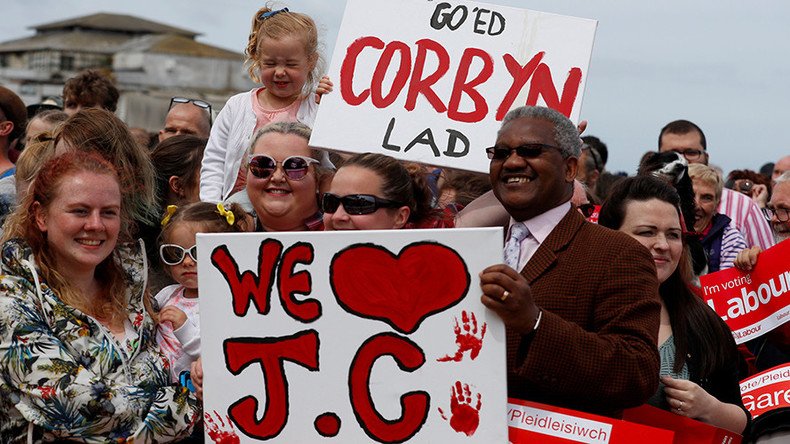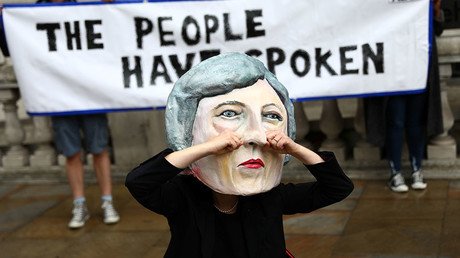UK Election: Moral victory for Corbyn & the politics of solidarity

The story of the UK general election is a huge personal and moral victory for Jeremy Corbyn with a politics of hope and solidarity, and a cataclysmic personal defeat for Theresa May with a politics of cynicism and austerity.
Confounding the opinion polls - to prove again their irrelevancy - the end result of the most seismic UK election in a generation is a hung parliament. What this means is that no party has won the 326 seats out of the 650 available required to achieve a working majority, necessary to ensure their policies are voted through Parliament as legislation.
Incumbent Prime Minister Theresa May is for now ruling out stepping down, as Corbyn and his supporters are demanding in the wake of this result. It is hard to see how she can possibly continue though, even with the support of the Democratic Unionist Party (DUP) as part of a hard right coalition – certainly not after the humiliating reverse she’s just suffered at the hands of the electorate. When we consider that she started this election campaign over 20 points ahead in most polls, the extent of this stunning turnaround cannot be overstated. Yet at present, like a latter day King Canute, the Prime Minister is refusing to confront reality, choosing instead the sanctuary of an establishment bubble in Westminster. If this is “strong and stable leadership” then I’m a banana.
Hubris has been Theresa May’s undoing. She did not have to call this election, and did so fully expecting to waltz back into Downing Street on the back of a huge majority. Her arrogance was reflected in one of the most lackluster and uninspiring campaigns for political office in British electoral history. She made the mistake of confusing an election with a coronation, it clearly having slipped her mind that the country already has a Queen and does not need, or surely desire, another one.
Surveying this result, the confusion it has wrought, what must EU officials in Brussels be thinking as they get ready to kick-start Brexit negotiations in a couple of weeks’ time? One thing we all know beyond doubt is that Britain’s negotiating position in those talks, already weak, just got significantly weaker with May at the helm.
North of the border in Scotland, meanwhile, the Scottish Nationalist Party (SNP), led by Nicola Sturgeon, suffered its own sobering reversal, losing 21 seats to take their total down from 56 to 35 seats at Westminster. In essence, the SNP has been a victim of its own success, having won an astounding 50 seats at the last election in 2015. There was no way they were going to hold onto all 56 seats, but a loss of over 20 seats was not anticipated. Their loss came at the hands of Labour and especially Tory gains.
Indeed, in Scotland the entire Tory campaign was based on opposition to a second referendum on Scottish independence. The result proves that this Tory election strategy north of the border was successful.
This being said, Nicola Sturgeon was left with little alternative other than to put the prospect of a second referendum on Scottish independence on the table after last year’s EU referendum. Of the votes cast in Scotland in that referendum, 62 percent were cast in support of remaining in the EU. Yet despite Sturgeon attempting to arrive at a compromise arrangement with Theresa May that would enable Scotland to retain its place in the single market while remaining within Brexit Britain, she was roundly rebuffed. In so doing the Tories left nobody in any doubt that to them Scotland is merely a region within the UK rather than a partner nation of the UK.
#HungParliament: ‘Disastrous’ night for @theresa_may as snap election gamble backfires (VIDEO). https://t.co/FcnKbLRVAx
— RT UK (@RTUKnews) June 9, 2017
Ultimately, the honeymoon period enjoyed by the SNP since the referendum on Scottish independence in 2014 is over. Voters in Scotland have no desire for another referendum on independence just 20 months after the last one, regardless of the EU referendum result, with the onset of election fatigue self-evident.
Overall, the story of this election is Labour’s astonishing result and the momentous personal and moral victory achieved by the party’s leader, Jeremy Corbyn. Since the day he was elected the most unlikely leader the party has had in a generation, based on the media-focused and conflated figures who’d led the party previously – i.e. Tony Blair, Ed Miliband – Corbyn has been subjected to the most withering demonization by the Tory press of probably any political figure of the left since his mentor the late Tony Benn.
Yet despite this relentless media assault, and despite having to lead without the support of his own parliamentary colleagues on the Labour benches behind him - colleagues who spared no opportunity to undermine and try to derail his authority - he kept his nerve and equanimity and stayed the course.
His manifesto for government was a game-changer, planting Labour’s colors squarely on the side of working people with its proposal to tax the rich and redistribute wealth to the poor and low waged in particular – in other words to reverse a process whereby, under the rubric of austerity, wealth had been transferred in the other direction.
The UK in 2017 is a right-wing dystopia, replete with food banks, crippling levels of poverty, and an ocean of human despair. Austerity, rolled out in response to the global economic crash and recession caused by the reckless greed of the rich, has nothing to do with economics and everything to do with ideology. It has been tantamount to the unleashing of a war against the working class in service to the god of neoliberalism.
Corbyn’s manifesto came as a rejoinder to that, to the politics of cynicism and callous cruelty, advocating desperately needed state intervention in the economy and solidarity with those who’ve been battered and bruised over seven years of Tory rule. In a remarkable symmetry with the success enjoyed by Bernie Sanders in the US primaries of 2016, Corbyn enjoyed huge support from young voters, many casting a ballot for the first time, with his vision of a society underpinned by common human decency.
Whatever happens now is anybody’s guess. The most likely scenario in the months ahead is another election in order for either Labour or the Tories to achieve a majority by which to govern the country effectively, especially with the Brexit process being so important to its economic future.
Theresa May has asserted that despite presiding over the party’s reduced majority in the Commons that she is the one to navigate the UK through what promises to be tortuous Brexit negotiations. Thus far, however, key members of her cabinet have been keeping ominously silent when it comes to offering her their fulsome support. Significantly, when approached by the media to get his view on Theresa May being able continuing as Prime Minister in light of this result, Foreign Secretary Boris Johnson answered with a wry smile.
As Shakespeare reminds us, “There’s daggers in men’s smiles.”
The statements, views and opinions expressed in this column are solely those of the author and do not necessarily represent those of RT.















